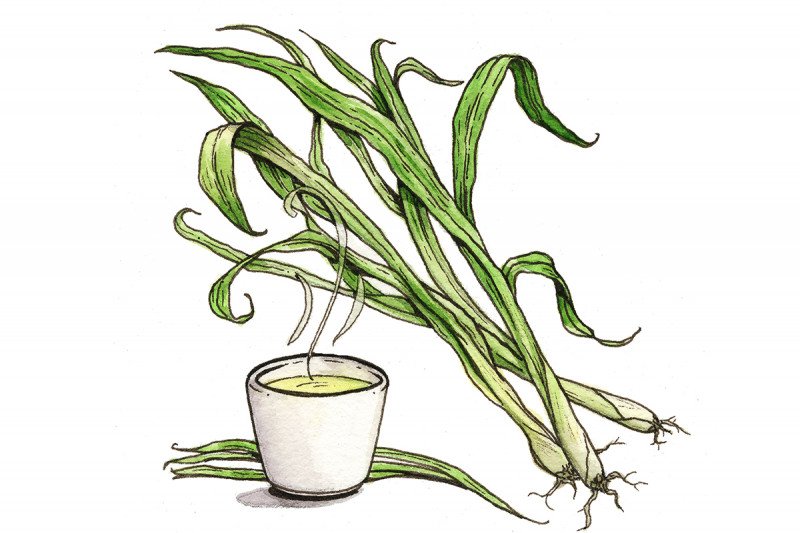
Common Names
- Fever grass
- Barbed wire grass
- Silky heads
For Patients & Caregivers
Tell your healthcare providers about any dietary supplements you’re taking, such as herbs, vitamins, minerals, and natural or home remedies. This will help them manage your care and keep you safe.
Lemongrass is used in traditional medicine and aromatherapy, but studies in humans are limited.
There are over 140 species of lemongrass that are prevalent in many parts of Africa and Asia. It is widely used as a flavoring agent in Asian cuisine, in perfumery, and as an insect repellent.
Lemongrass has been used in folk medicine for sleep, anxiety, and gastrointestinal problems. These effects have mostly been shown in animal studies. More research is needed to confirm such effects in humans.
- To reduce anxiety
In clinical studies, lemongrass tea did not lower anxiety or produce calming effects. - To improve sleep
Animal studies suggest sedative effects, but this has not been shown in humans. - To prevent infections
Lab studies show that lemongrass has activity against various microorganisms. A few studies in humans suggest it may help as an antifungal treatment or with chronic gum disease, but more studies are needed.
Oral: Dizziness, drowsiness, dry mouth, excess urination, and increased appetite.
In high doses, lemongrass essential oil can damage liver and stomach mucous membranes.
Excessive intake of lemongrass tea may also affect kidney function.
Topical: Skin rash from lemongrass essential oils
Case report
Delayed skin rash from both topical and oral use: In a 52-year-old massage therapist who also practiced aromatherapy with essential oils including lemongrass. The rash also returned after she drank lemongrass tea.
Do Not Take if:
- You are taking glutathione-S-transferase drugs: Although no interactions have been reported, ingesting amounts of lemongrass over standard culinary use may increase the risk of drug side effects.
- You are taking CYP450 substrate drugs: Although no interactions have been reported, ingesting quantities of lemongrass over standard culinary use may increase the risk of drug side effects.
Special Point:
Citral and myrcene, compounds present in lemongrass, caused birth defects in rats. Therefore, it may be advisable to avoid it during pregnancy.
For Healthcare Professionals
The genus Cymbopogon comprises several lemongrass species (1) prevalent in tropical regions of Africa and Asia, (2) including C. citratus (West Indian) and C. flexuosus (East Indian). Lemongrass is widely used as a flavoring agent in Asian cuisine, in perfumery, and as an insect repellent (6). It has been used in folk medicine as a sedative (3), to reduce gastrointestinal problems (4), and for its CNS-depressant effects (5). Lemongrass is also consumed as a tea and used in aromatherapy.
Preclinical studies suggest lemongrass has many properties including antimicrobial (21) (23) (24), anxiolytic (35), and vasorelaxant (10) effects. Limited data in humans suggest lemongrass essential oil products might help chronic periodontitis (41) (50) and oral thrush (7). In other studies, lemongrass tea did not reduce anxiety or benefit sleep (5).
High doses or long-term use of lemongrass tea may have adverse effects on renal function (44).
Lemongrass is used to flavor many foods and beverages. The dried leaves are used to make tea.
- Antimicrobial
- Anxiolytic
- Sedative
Preclinical studies suggest antioxidant properties may help prevent endothelial dysfunction via NO-independent vasodilator effects (46). Anxiolytic activity of lemongrass appeared to be mediated by the GABAergic system (35).
In humans, lemongrass essential oil aromatherapy may act through olfactory or nose-to-brain pathways to restore homeostasis (45).
Oral: Dizziness, drowsiness, dry mouth, excessive urination, and increased appetite (5) (7).
High doses of the essential oil of C. citratus can damage liver and stomach mucosae (18). Excessive ingestion of lemongrass tea may also have negative effects on renal function (44).
Topical: Contact dermatitis (48).
Case report
Delayed contact dermatitis (topical and oral): In a 52-year-old massage therapist who practiced aromatherapy with essential oils including lemongrass. Cutaneous symptoms recurred following ingestion of lemongrass tea (49).